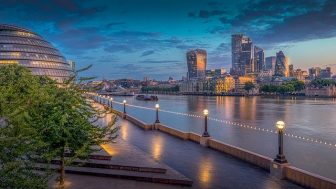 Demand for property in prime London remains relatively subdued amid economic and political uncertainty, according to Knight Frank
Demand for property in prime London remains relatively subdued amid economic and political uncertainty, according to Knight Frank
The number of offers made above £5m was 22% below the five-year average in April and May (excluding 2020), which compares to a decline of 9% below £5m. Meanwhile, there was a 4% hike in the number of new prospective buyers registering below £5m, but a 7% fall above that figure.
The supply-demand imbalance has narrowed, placing downwards pressure on property prices. The number of new sales instructions was 12% above £5m and 18% up in the sub-£5m price bracket.
“Property is coming to the market as sellers realise that prices won’t rally any time soon and rates aren’t going to come down quickly,” said Stuart Bailey, head of super prime London sales at Knight Frank. “Viewings are still taking place and demand is there, but it’s just below the surface for now.”
Average prices in prime central London (PCL) fell by 2.4% in the year to May, after declining 0.9% over the last three months. In prime outer London (POL), average prices fell by 1.2% over the year, which followed a rise of 0.3% over the last three months.
Once again, it was domestic and needs-driven markets that fared best. The top price performers in the capital in the year to May were Wandsworth (+5%) and Dulwich (+2.6%).
“As discretionary buyers adopt a more cautious approach ahead of the election, we have revised our prime central London forecast. We now expect a 1% decline this year as opposed to the 1% increase we estimated in January. We expect growth of 16.4% in the five years to 2028 as latent demand ultimately kicks in,” said Tom Bill is head of UK residential research at Knight Frank.
Bill said the best news for prime and super-prime property markets in recent weeks has been the announcement of an event that will not happen. Shadow Chancellor Rachel Reeves said last month that Labour would not hold an emergency Budget if it won the election, instead giving the Office for Budget Responsibility time to assess the impact of its plans.
He commented: “Among other things, the pause would enable a conversation about the effectiveness of its proposal to raise £2.6 billion by changing the non dom rules. There are 68,800 non doms in the UK and under a fairly complex system they don’t pay tax on their non-UK income.
“Chancellor Jeremy Hunt announced an overhaul of the rules in March with new restrictions that included a four-year time limit. Labour countered with its own tougher measures a month later.
However, after Hunt and the civil service consulted with the tax industry, the chancellor was reportedly set to prolong the four-year period and make other tweaks to ensure that non-doms didn’t leave the UK in sufficient numbers to mean the changes were counter-productive. The same civil servants are likely to relay this message to any new government and Labour may ultimately favour a more pragmatic approach if it wins power.


Comments are closed.